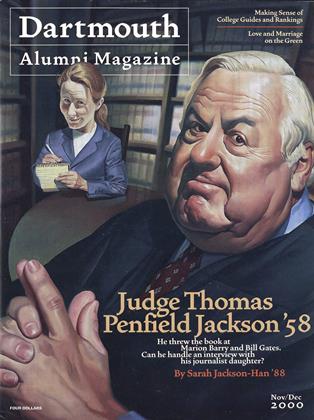The man who runs Dartmouth's $2.49-billion endowment lets the numbers speak for themselves.
ENDOWMENT INCOME HAS GROWN faster than any other revenue source at Dartmouth over the past decade. In the last fiscal year, which ended June 30, the value of the endowment increased by 46 percent ($780 million) for a year-end valuation of $2.49 billion. Next year the endowment will distribute more than $90 million to support College operations. Associate vice president of investments Jonathon King has managed the endowment for nine of the last 10 years.
Managing more than $2 billion must bea pretty complex job. How do you do it?
I work closely with the investment committee of the board of trustees. We discuss matters like target asset allocation—deciding how much to invest in stocks, bonds or other asset classes. We're not directly managing the endowment by picking bonds and stocks in Hanover. Instead, we hire external investment managers. Right now, more than 75 managers hold a piece of the Colleges portfolio, focusing on their own particular specialty to invest in an array of domestic and international stocks, domestic bonds, alternatives such as hedge funds and venture capital, and oil, gas and real estate.
What are your primary goals with theendowment?
To supply the College with as much of a sustainable spending stream as we can. It is also our goal to place the endowments performance in the top quartile of colleges and universities over periods of three years or longer. We've managed to do that. For the most recent three-five- and 10-year periods, Dartmouth's endowment ranked in the upper decile of college and university returns.
What's been the main driver of the endowment's significant growth?
Venture capital returns have been nothing short of phenomenal over the past five years. Venture capital is part of our private equity portfolio. Private equity returned 320 percent for the 12 months ending June 30. The five-year average annual return was 82 percent, and the three-year compound annual return was 108 percent. A good example of the kind of company we've been able to invest in through venture capital funds would be Phone.com, which created software that allows cellular phones to access the Internet. The Colleges initial investment was about $300,000. We sold our shares earlier this year for more than $25 million.
How did last spring's market meltdownaffect the endowment?
We took a fair amount of money off the table before the March 10 downturn, selling $250 million worth ofventure capital stock between January 1 and March 31. This is even more remarkable considering that at the start of the Colleges fiscal year, the market value of the venture capital portfolio was less than $200 million.
How has the College's investmentstrategy evolved during the past twodecades?
Twenty years ago, the bulk of the College's assets were invested in fairly traditional portfolios of blue-chip domestic stocks and high-grade bonds. Now these two asset classes make up less than 50 percent of the portfolio, having been joined by international equities, smaller-company domestic stocks, venture and private capital, hedge funds and other alternative, more sophisticated strategies. All told, the Colleges portfolio currently is invested 68 percent in equities, 25 percent in fixed-income and 7 percent in real estate.
What's your outlook for the economyand the market?
I believe that the returns that we've become accustomed to over the past five to 10 years, with stocks returning 15 percent to 20 percent a year, are unsustainable. The markets are, without question, overvalued. The question is: Do we revert to the mean through some sort of cataclysmic event, or will we experience a few years of sub-par returns?
What keeps you up at night?
Asking myself if we're well-enough prepared for the inevitable downturn.
How does your personal investmentphilosophy differ from your approachto the endowment?
Honestly, I'm not comfortable answering that question. Some decisions regarding the endowment may come from my gut, but personality and ego are not part of the equation. My job is simple. I'm here to implement a process, organize the portfolio and let the numbers speak for themselves.
Jonathon King
ROBERT JAMES BAUER is a freelancewriter. He lives in Strafford, Vermont.
 View Full Issue
View Full Issue
More From This Issue
-
 Cover Story
Cover StoryFather In Law
November | December 2000 By SARAH JACKSON-HAN ’88 -
 Feature
FeatureAnd the Bride Wore Green
November | December 2000 By MEG SOMMERFELD ’90 -
 Feature
FeaturePolitical Junkie
November | December 2000 By Jake Tapper ’91 -
 Feature
FeatureWISDOM OF THE GUIDES
November | December 2000 -
 Feature
FeatureOVER-RATED
November | December 2000 -
 Feature
FeatureWHAT STUDENTS SAY
November | December 2000
Interviews
-
 Interview
InterviewA Fan's Notes
Sept/Oct 2007 -
 Interview
InterviewPicture Perfect
MARCH 2000 By CHRISTOPHER KELLY ’96 -
 THE DAM INTERVIEW
THE DAM INTERVIEWJim Kim
Jan/Feb 2012 By Irene M. Wielawski -
 Interview
InterviewLook Who’s Talking
MAY | JUNE 2021 By Madison Wilson ’21 -
 Interview
InterviewDoing the Dirty Work
Mar/Apr 2005 By Sean Plottner -
 Interview
InterviewQ & A
Jan/Feb 2004 By Sue DuBois '05

